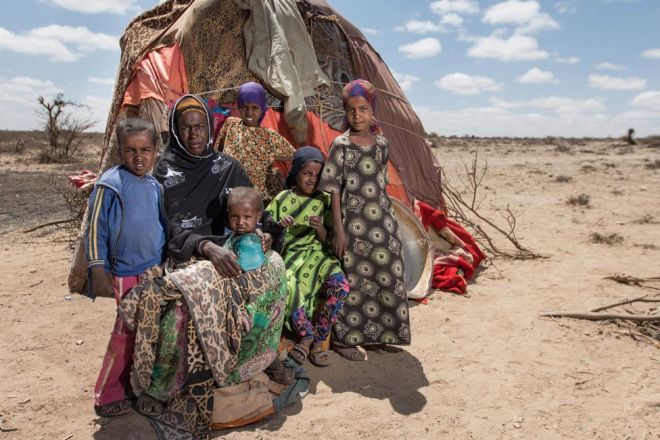REUTERS: Wednesday May 17, 2017

Prompt humanitarian action has kept drought-ridden Somalia from sliding into famine so far but more resources, better security and increased access to remote areas are needed to bring the country back from the brink, experts said on Tuesday.
Almost 3 million people are facing starvation in the Horn of Africa nation that is suffering the effects of repeated rain failures and decades of conflict, according to the United Nations.
A pre-famine alert was issued in February, a move that U.N. officials credit with helping to avert a repeat of the 2011 famine, when the aid response was slow and more than 250,000 people died of starvation.
"After early warning in Feb, the combined actions from donors, humanitarians & Somali gvt have averted the worst scenario," Dominique Burgeon, director of the emergency division at the U.N. Food and Agriculture Organization (FAO) said in a Twitter conversation hosted by the Thomson Reuters Foundation.
But some 6.2 million Somalis still require aid after drought withered crops, killed livestock and dried up waterholes, according to the United Nations.
Heavy seasonal rains that started in April will allow farmers to plant crops but also bring cold and spread disease, a double threat for people and animals whose immune systems have been weakened by sustained hunger. [nL4N1I62VX]
"Large-scale relief assistance IS making a difference, but needs are rising. Race against time to #avertsomaliafamine," wrote Challiss McDonough, a spokeswoman for the U.N. World Food Programme (WFP).Almost 3 million people are facing starvation in the Horn of Africa nation that is suffering the effects of repeated rain failures and decades of conflict, according to the United Nations.
A pre-famine alert was issued in February, a move that U.N. officials credit with helping to avert a repeat of the 2011 famine, when the aid response was slow and more than 250,000 people died of starvation.
"After early warning in Feb, the combined actions from donors, humanitarians & Somali gvt have averted the worst scenario," Dominique Burgeon, director of the emergency division at the U.N. Food and Agriculture Organization (FAO) said in a Twitter conversation hosted by the Thomson Reuters Foundation.
But some 6.2 million Somalis still require aid after drought withered crops, killed livestock and dried up waterholes, according to the United Nations.
Heavy seasonal rains that started in April will allow farmers to plant crops but also bring cold and spread disease, a double threat for people and animals whose immune systems have been weakened by sustained hunger. [nL4N1I62VX]
Last week the United Nations increased its appeal for the country by $900 million to a total of $1.5 billion. [nL8N1ID3WF]
But pouring in money alone will not solve the problem, said Nisar Majid, a researcher at the Feinstein International Center.
"Access and capacity to respond is the limitation, not resources," he wrote.
While African Union and Somali troops have driven Islamist militant group al Shabaab from major urban strongholds and ports, they have struggled to defend smaller, more remote areas from attacks.
Road blocks, conflict and extortions at checkpoints are restricting travel in most of southern and central Somalia, driving up the cost of delivering aid, the United Nations said. [nL8N1I647I]
Longer term investments to revive Somali's agricultural sector, which 30 years ago produced about twice as much food as now, and shore up its economy from future shocks were also part of the solution, according to government and U.N. officials.
"#Somalia needs development projects to avoid reccurring famine for good," tweeted the country's minister of information, Abdirahman Osman.
Road blocks, conflict and extortions at checkpoints are restricting travel in most of southern and central Somalia, driving up the cost of delivering aid, the United Nations said. [nL8N1I647I]
Longer term investments to revive Somali's agricultural sector, which 30 years ago produced about twice as much food as now, and shore up its economy from future shocks were also part of the solution, according to government and U.N. officials.
"#Somalia needs development projects to avoid reccurring famine for good," tweeted the country's minister of information, Abdirahman Osman.
No comments:
Post a Comment